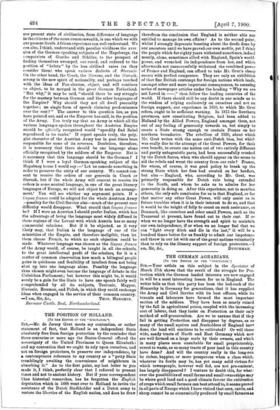THE POSITION OF HOLLAND.
[TO THE EDITOR OP THE " SPECTATOR.1
SIR,—Mr. de Jersey Grat meets my contention, or rather statement of fact, that Holland is an independent State absolutely free from foreign protection by the reminder that three centuries or more ago the States-General offered the sovereignty of the United Provinces to Queen Elizabeth and my contention that we ought to rely upon ourselves, and not on foreign protectors, to preserve our independence, by a contemptuous reference to my country as a " petty State tremblingly awaiting the convenience of neighbours in absorbing it." As to the first point, my last letter to you made it, I think, perfectly clear that I referred to present times and not to ancient history. But if your correspondent likes historical researches, has he forgotten the English deputation which in 1688 went over to Holland to invite the assistance of the Dutch Stadtholder and a Dutch army to restore the liberties of the English nation, and does he draw
therefrom the conclusion that England is neither able nor entitled to manage its own affairs ? As to the second point, whilst I strongly deprecate boasting about the deeds done by our ancestors until we have proved our own mettle, yet I think the people which for eighty years withstood sometimes, indeed mostly, alone, sometimes allied with England, Spain's world- power, and wrenched its independence from her, and which afterwards not unsuccessfully withstood the combined power of France and England, can afford to take Mr. Grnt's cheap sneers with perfect composure. They are only an exhibition of that fine British contempt for foreign nations which leads, amongst other and more important consequences, to amusing series of newspaper articles under the heading " Why we are not Loved in —," then follow the leading countries of the world. If there should still be any doubt in our minds as to the wisdom of relying exclusively on ourselves and not on foreign support, oar experience in 1830, to which Mr. Grut refers, ought to be sufficient warning. In 1815 the Southern provinces, now constituting Belgium, had been added to Holland by the Allied Powers, England amongst them, not out of any feeling of generosity towards us, but simply to create a State strong enough to contain France on her northern boundaries. The rebellion of 1830, about which Mr. Grut writes with the same anti-Dutch bias, but which was really due to the attempt of the Great Powers, for their own benefit, to create one nation out of two entirely different and partly antagonistic parts, had been successfully crushed by the Dutch forces, when who should appear on the scene to aid the rebels and wrest the country from our rule ? France, for whom, of course, it was good policy to break up the strong State which her foes had created on her borders, but also — England, who, according to Mr. Grut, was primarily responsible for Dutch rule being extended to the South, and whom he asks us to admire for her generosity in doing so. After this experience, not to mention others, the only safe conclusion for us is that England, or for that matter any other Great Power, will only assist us in future troubles when it is in their interest to do so, and that it would be the height of folly to count on such assistance, as Denmark, like ourselves and other small Powers, such as the Transvaal at present, have found out to their cost. If or when we no longer have the strength and spirit to maintain our own independence, if or when we no longer feel that we can "fight every ditch and die in the last," it will be a hundred times better for us frankly to admit our impotence and throw in our lot with one of the great nations voluntarily than to rely on the illusory support of foreign protectors.—I






































 Previous page
Previous page